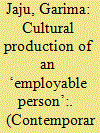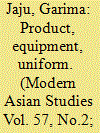|
|
|
Sort Order |
|
|
|
Items / Page
|
|
|
|
|
|
|
| Srl | Item |
| 1 |
ID:
161154


|
|
|
|
|
| Summary/Abstract |
Madrasas are increasingly being reformed across South Asia with the intended aim of ‘social change’ through mainstreaming its marginalized Muslim population. While the transformative change, as promised in policy and popular discourse, remains distant, a vernacular cultural variant of this ‘change’ is intimately felt in the changing subjectivities of the students. As future holders of degrees now recognized by the government, the students imagine themselves as ‘employable persons’. In so doing, they challenge their long drawn marginal position in the economy and society as ‘unemployable persons’. By separating ‘being employable’ from being employed, the students are social agents innovatively responding to the broader socio-cultural and political economy, to achieve an elevated status for themselves, despite their likely unemployment and continued socio-economic marginality. While the madrasa students fail in accessing social mobility, they reproduce their condition in an agentive manner – through contestation and ‘partial penetration’.
|
|
|
|
|
|
|
|
|
|
|
|
|
|
|
|
| 2 |
ID:
193606


|
|
|
|
|
| Summary/Abstract |
The article focuses on how low and lower-middle class youth employed in new private sector jobs in the booming service economy in Indian cities engage with the material environment of their workplace, and how, through their ‘aesthetic scrutiny’ of its materiality, come to ‘consume’ work. The setting is the store floor of a fast-expanding organized retail company, called Spexy, that sells budget eyewear products. Through ethnographic elaboration, the article follows how the Spexy staff deride the ‘un-branded’ products, ‘un-technical’ equipment, and ‘un-professional’ uniforms at their workplace. The company, as constituted of these ‘poor’ materials, is mocked for failing in its ‘company-ness’ and branded ‘fake’. The material environment of the workplace provides a platform for the articulation of larger configurations of ‘feelings’ the youth seek to give and get through formal employment in a private company. These articulations, in turn, reveal larger sociocultural valuations regarding ideas of social mobility and visibility in contemporary India where there is a strong interest in brand regimes and brand value hierarchies, fixation with technological education and expertise, and attraction towards a corporate work culture in the private sector, and, concomitantly, a strong desire amongst the store staff to craft branded, technical, and professional work identities. By putting the scholarship on work and consumption in dialogue, the article demonstrates how bottom-rung urban workers look expectantly to the material environment of company work to fulfil these desires.
|
|
|
|
|
|
|
|
|
|
|
|
|
|
|
|
|
|
|
|
|